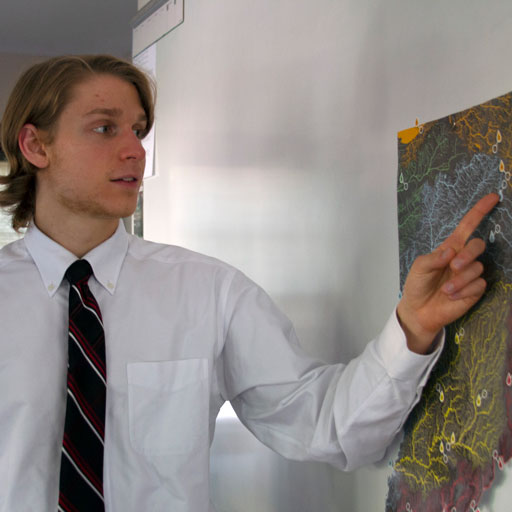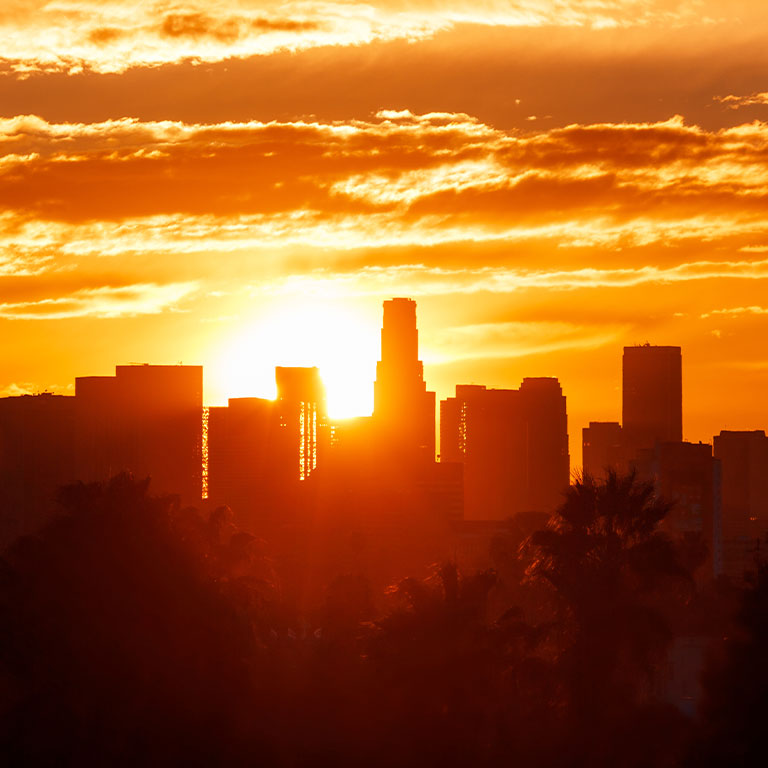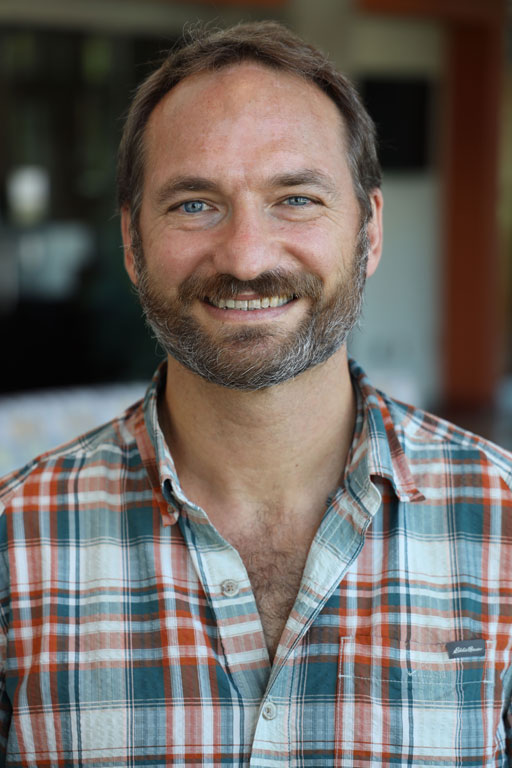Description of the video:
[Music fades in]
[Video: Man wearing baseball cap and blue shirt in a field, holding some soil in his hands; IU logo appears throughout video at upper right]
Man speaks in voiceover: Everything's more extreme.
[Video: Close up of man’s hands feeling soil]
We've lost our balance.
[Video: Man seated outside, speaking to camera; words “Dan DeSutter, Owner and Operator of DeSutter Farms” appear beneath]
We have events that are more severe, when it rains, it rains more, when it stays dry, it stays dry longer, when it gets hot, it gets hotter.
[Video: Dan DeSutter walking in field]
Dan DeSutter speaks in voiceover: As farmers, we have control over a lot of things but one of the things we don't have control over is the weather.
[Video: close up farm machinery against sun and sky]
Dan DeSutter speaks in voiceover: The world is evolving so fast, we in agriculture
[Video: closeup of large truck arriving outside grain bin]
Dan DeSutter speaks in voiceover: don't have the tools and background to interpret
[Video: Farm machinery working in field]
Dan DeSutter speaks in voiceover: and analyze and understand that always.
[Video: Dan DeSutter and another man speaking in field, silhouetted against sky]
Dan DeSutter speaks in voicover: There is a niche for an organization
[Video: overhead drone shot of farm machinery working in field]
Dan DeSutter speaks in voiceover: like ERI to step in and start really helping us understand the science behind what we're doing.
[Video: Shifts to woman with blonde hair seated at a desk and working on a computer]
Woman speaks in voiceover: I learned about the Environmental Resilience Institute after taking office.
[Video: Women speaking to camera; words “Emily Styron, Mayor of Zionsville, Indiana” appear beneath]
Part of the way that we found out about ERI is because one of my goals as mayor was
[Video: Emily Styron sits at desk in her office and speaks to colleague standing in the doorway]
Emily Styron speaks in voiceover: to form an environmental or a sustainability commission.
[Video: Emily Styron smiles as she speaks to visitor in her office]
Emily Styron speaks in voiceover: And I think that's important
[Video: Emily Styron, seated and speaking to camera]
when we're moving forward with any sort
[Video: Emily Styron and female colleague walk through Zionsville Town Hall building doors, wearing face masks]
Emily Styron speaks in voiceover: of science-based approach that we start
[Video: Police officer wearing face mask at front desk in Zionsville Town Hall smiles and waves]
with an inventory,
[Video: Emily Styron and female colleague talk to police officer seated at desk]
Emily Styron speaks in voiceover: that we find out where we are, and then we
[Video: Emily Styron, seated and speaking to camera]
measure against that in year after year. So without the ERI, we would never have been able to do that on our own.
[Video: Emily Styron and female colleague speak in front of a large city map]
Emily Styron speaks in voiceover: Because this really is a building block
[Video: Emily Styron and female colleague speak in front of 3 posters related to the city of Zionsville]
Emily Styron speaks in voiceover: for us to have data, to engage
[Video: female colleague gestures at city map poster]
Emily Styron speaks in voiceover: our community and start to set some
[Video: Styron gestures in conversation with colleague]
Emily Styron speaks in voiceover: community priorities and
[Video: Emily Styron, seated and speaking to camera]
ideally set up our own sustainability commission and begin to create more long range planning
[Video: Emily Styron and female colleague walk outside along wooded path]
Emily Styron speaks in voiceover: around maintaining and improving our
[Video: Closeup of Emily Styron speaking to colleague as they walk]
Emily Styron speaks in voiceover: local environment. This is
[Video: Emily Styron, seated and speaking to camera]
an opportunity for our community to define what
[Video: closeup of white hard hat with Zionsville city logo on it]
mitigating climate change looks like for us.
[Video: Emily Styron, seated and speaking to camera]
What I'm excited about is that this is
[Video: Emily Styron looks at large Zionsville city logo on wall]
Emily Styron speaks in voiceover: a community based approach
[Video: Emily Styron, seated and speaking to camera]
that is using science to help inform us of how we develop policy.
[Video: Dan DeSutter, shown from the rear, as he walks across a field]
Dan DeSutter speaks in voiceover: There’s no question that the more resilient the system we build,
[Video: Dan DeSutter, seated outside and speaking to camera]
the more efficient we are, the more control we have over our own destiny.
[Video: Dan DeSutter climbs inside large piece of farm machinery]
Dan DeSutter speaks in voiceover: We all benefit from a better environment
[Video: overhead drone shot of farm machinery working in field]
Dan DeSutter speaks in voiceover: cleaner water,
[Video: Farm machinery moving across field]
Dan DeSutter speaks in voiceover: cleaner air, healthy soils, higher quality food.
[Video: farm machinery moves across field alongside a road, as truck drives by]
Dan DeSutter speaks in voiceoer: The resilience that is
[Video: Dan Desutter steps down out of large piece of farm machinery]
Dan DeSutter speaks in voiceoer: required in a system to produce these things
[Video: Dan DeSutter and another man speaking in field next to large farm machinery, silhouetted against sky]
Dan DeSutter speaks in voiceover: is where ERI can play a major
[Video: Dan DeSutter crosses arms and smiles as he looks at camera]
Dan DeSutter speaks in voiceover: in helping Hoosier farmers
[Video: Dan DeSutter, seated outside and speaking to camera]
to provide those ecological services to all Hoosiers.
[Video fades to white screen. Indiana University logo and grandchallenges.iu.edu appear]
[Music fades out]




